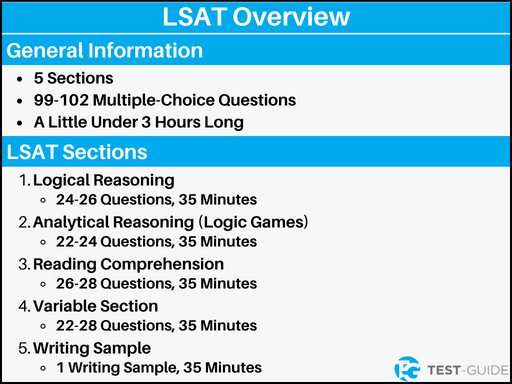The Law School Admissions Test (LSAT) is an assessment used by law schools during their admissions process.
The LSAT is administered by the Law School Admission Council (LSAC). Some key features of the LSAT are:
- Standardized Exam
- 99-102 Multiple-Choice Questions
- 1 Writing Sample
- A Little Under 3 Hours Long
Learn more about what is on the LSAT, a breakdown of each LSAT section, and more with our complete guide to the LSAT. Take our free LSAT practice test to start preparing.
What is on the LSAT?
The LSAT includes 5 total sections. 4 sections are multiple-choice and the last section is the writing sample.
Only 3 sections count towards your score. The exam is a little under 3 hours long.
| LSAT Section | Time Limit | # of Questions | % of Total Score |
|---|---|---|---|
| Logical Reasoning | 35 minutes | 24-26 | 33% |
| Analytical Reasoning (Logic Games) | 35 minutes | 22-24 | 31% |
| Reading Comprehension | 35 minutes | 26-28 | 36% |
| Variable | 35 minutes | 22-28 | 0% |
| Writing Sample | 35 minutes | 1 | 0% |
Beginning in August 2024, the Analytical Reasoning (Logic Games) section will no longer be included on the exam.
LSAT Sections
There are 5 total sections on the LSAT. 4 of those sections will be multiple-choice and 1 of those sections will be a writing sample.
- Logical Reasoning (Scored)
- Analytical Reasoning (Scored)
- Reading Comprehension (Scored)
- Variable (Unscored)
- Writing Sample (Unscored)
We provide an in-depth look at each of those LSAT sections below. To practice for these sections, take our LSAT practice test.
Logical Reasoning
- 4 Passages
- 5-8 Multiple-Choice Questions Per Passage
- 35 Minutes Long
- Scored
The Logical Reasoning section of the LSAT tests your ability to quickly analyze and critique a given narrative. You will be tasked with reading short passages and answering multiple-choice questions about each one.
The Logical Reasoning section of the LSAT includes 4 main passages with each passage having 5-8 multiple-choice questions.
This section of the exam will be scored and counts for 33% of your score. Additional information on Logical Reasoning.
Analytical Reasoning (Logic Games)
- 4 Logic Games (Passages)
- 5-8 Multiple-Choice Questions Per Passage
- 35 Minutes Long
- Scored
The Analytical Reasoning section, also known as “Logic Games,” will pose questions to you based on complex or ambiguous passages.
You will be asked to read a passage and answer questions that test your logic, outcomes, and systems of order. The passages will typically consist of a set of statements, rules, or conditions.
The Analytical Reasoning section of the LSAT includes 4 logic games with each game having 5-8 multiple-choice questions.
This section of the exam will be scored and counts for 31% of your score. Beginning in August 2024, this section will no longer be given on the LSAT. Additional information on Analytical Reasoning.
Reading Comprehension
- 4 Passages
- 5-8 Multiple-Choice Questions Per Passage
- 35 Minutes Long
- Scored
The Reading Comprehension portion of the exam consists of questions based around 4 passages. 3 of the passages will be passages with one author. 1 of the passages will be a combination of passages from different sources.
You will be tasked with answering multiple-choice questions based on each passage. The questions will gauge your ability to draw inferences, determine main ideas, and understand difficult and scholarly language.
This section of the exam will be scored and counts for 36% of your score. Additional information on Reading Comprehension.
Variable Section
- Can be Logical Reasoning, Analytical Reasoning, or Reading Comprehension
- Will Not Know Which Section is the Variable Section
- Unscored
The Variable, or “Experimental” section of the LSAT is not scored, but you will not be aware which section is experimental.
This may consist of an extra logical reasoning, analytical reasoning, or reading comprehension section.
This section is used by the LSAC for testing out new questions to see how they perform.
Writing Sample
- 35 Minutes Long
- Unscored
The Writing Sample section of the exam consists of a prompt that you will be asked to respond to. You will have 35 minutes to answer the prompt.
You will be able to take the writing portion of the exam up to 8 days before your actual exam. You must have a completed writing sample on file before your scores are released.
This section is unscored, but law schools will use it as part of the admissions process, so it is important to do well on this section. Additional information on the Writing Sample.

Start preparing for these sections of the LSAT with a free LSAT practice questions.
How Long is the LSAT?
Each of the sections on the LSAT are 35 minutes long. This brings the total time to take the LSAT to just under 3 hours.
You will have a 10-minute break between the 2nd and 3rd sections of the exam. During this time, you can leave the testing area to use the restroom or have a snack. You will not be permitted to check your phone.
Scoring of the LSAT
3 of the 5 sections will count towards your score:
- Logical Reasoning: 33% of Total Score
- Analytical Reasoning: 31% of Total Score
- Reading Comprehension: 36% of Total Score
The Variable Section and Writing Sample will not count towards your score. You will not know which section is the Variable Section.
The LSAT is scored on a scale from 120-180. You will see 3 types of scores on your score report:
- Raw Score: The Number of Questions You Answered Correctly.
- Scaled Score: Your “Final Score” and is Some Number Between 120-180.
- Percentile Score: Compares Your Scaled Score to Other Test-Takers.
The median LSAT score is typically right around 152. You can read more about LSAT scores with our complete guide.
Scheduling for the LSAT
The LSAT is offered throughout the year.
There will be 2 important dates you need to be aware of when scheduling your exam:
- Registration Deadline: The Last Day You Can Register for that Specific Test Date.
- Scheduling Opens: The First Day You Can Schedule Your Exam.
You will have the option of taking the exam online (remotely proctored) or at a testing center. To find a list of testing centers near you, log into your LSAC account and go to the Centers (In-Person) testing page.
Registration and Fees for the LSAT
Anyone can take the LSAT. To register, you will need to create an LSAC account online, which must be completed at least one month before your desired test date.
The flat fee for taking the LSAT is $222, but there are also several add-ons that you may want to consider, such as:
- Credential Assembly Service (CAS): $200
- CAS Report: $45
- Score Preview: $45
- Official Candidate Score Report: $50
- Score Audit: $150
- Test Date Change: $135
For more information, visit the official LSAT fee’s page.
Frequently Asked Questions
Is the LSAT all multiple-choice?
There are 4 sections that are multiple-choice and 1 section that is a writing sample.
How many sections are there on the LSAT?
There are 5 total sections on the LSAT:
- Logical Reasoning
- Analytical Reasoning
- Reading Comprehension
- Variable Section
- Writing Sample
The variable section and writing sample are not scored.
How many questions are on the LSAT?
There are 99-102 total questions on the LSAT. These are all multiple-choice questions. There is also an unscored writing sample.
How long is the LSAT?
The LSAT is just under 3 hours long. You will have a 10-minute break between the 2nd and 3rd section.
How do you take the LSAT?
You can either take the LSAT at an in-person testing center or remotely online (proctored).
What order will the LSAT sections be administered on the actual exam?
The sections can be administered in any order.

